Daily Writing

| Shepherds of Christ Daily Writing |
 |
November 24, 2008
|
November 25th Holy
Spirit Novena |
The Novena Rosary
Mysteries |
Dear Rita,
I give my heart to Jesus and Mary with you in love.
A couple today told of a friend who has a priest friend who was unable to move his legs (possibly a stroke) and they put Jesus water on him and he is now walking and has gone back to the Philippines. I gave them a healing form to give to their friend. They said he uses the water every day on his legs.
Love Rosie


Jesus and Mary Water

Jesus Well

Mary Well
God has called
us to be united as a family in
This is a
vocation — to pray deeply for
Remember the
image of Our Lady
Those using the
special statues
When people have
set up a prayer corner/niche
Call Kathleen, Sheila
or Doris about statues or go 1-888-211-3041 or 1-812-273-8405
|
27” - $450.00
We send these.
They are good for
people
|
The Christian Encounters Others and the World
We are to walk hand-in-hand in love —
Our mission in the Shepherds of Christ is to help bring
about this era of love.
We are to be praying self-lessly for the priests,
the Church and the world.

Fr. Carter says in Mother At Our Side by Fr. Edward Carter, S.J.
Prudence
Prudence is that virtue which helps us to make the proper decisions in the exercise of our Christian life. Prudence aids us in making correct choices so that we do God's will in all areas of Christian existence.
Prudence is meant to influence every aspect of our participation in the mystery of Christ. It is always our guide as we strive to grow in the putting on of Christ.
What state of life does God wish me to embrace? What kind of work does he desire of me within that vocation? Among the various ways of expressing love, how am I to love God and others at this particular time? Am I working too much or too little? Am I too dependent upon others or not dependent enough? Prudence helps answer these and other questions concerning the Christ-life.
Some people think that prudence is merely an attitude of caution, an instinct that always leads us to take what seems to be the less dangerous path. True, prudence will lead us to choices of this nature—if God's will indicates this type of action—but prudence is also concerned with the bold and the daring, with taking risks, with magnanimous action. Again, the guiding principle is God's will. The prudent Christian will act boldly or daringly if, after taking the proper means to discern the divine will, she or he decides that God is indeed leading in such a direction.
If we are to be truly prudent persons, we must be persons of prayer. We need the light of prayer to see what decisions are to be made, what actions are to be undertaken. We need the strength of prayer to act upon the given light.
In her earthly journey, Mary was a most prayerful person and a most prudent one. Let us ask our mother to help us grow in the virtue of prudence. The Litany of the Blessed Virgin Mary so bids us to call upon the prudent Virgin: "Virgin most prudent, pray for us."
With regard to Justice Fr. Carter says
Justice
The virtue of justice bids us to give others what is their due. We must respect the rights of others. For example, we must respect the life, good name, and the property of others because they have rights concerning these values. Regarding one's right to life, we have a very timely application of this—the rights of the unborn, and we should all do our part in working against the terrible injustice of abortion. The fatalities which the United States has suffered in all her wars is less than one half of the total number of deaths the unborn suffer in one year here in the United States through abortion. And, of course, abortions are being performed all over the world—not just in the United States.
The world of work, professional service, and commerce also involve various applications of justice. The laborer must give an honest day's work and the employer is obligated to pay a just wage. The teacher must realize his or her duty to students by properly preparing classes and professional updating. The doctor must maintain proper medical knowledge in justice to his or her patients and manufacturers of goods as well as wholesale and retail sellers must establish just prices.
The Christian must also be aware of obligations regarding the great social problems that plague one's own country and nations around the world. We must listen to our Mother Mary.
With regard to Temperance — Fr. Carter says
Temperance
The attitude of moderation, which has traditionally been called the virtue of Christian temperance, allows us to relate properly to sense pleasure. God wants us to enjoy what is pleasurable, but He wants us to do so according to His will.
Without an attitude of temperance, a person's life becomes soft and selfish, given over to the wrongful pursuit of pleasure. Insofar as a person's life is thus misdirected, to that extent it fails in service to God and others.
There is an aspect of temperance that one can overlook—that the person who practices temperance enjoys the pleasurable more than does the person who does not. One who lacks temperance is actually a slave to his or her desires. These desires, to the extent they are inordinate, can never be satisfied, and, consequently, become insatiable. Grace does not destroy nature; it brings it to a perfection or fulfillment it could not otherwise attain. Our God-given capacity to enjoy what is pleasurable actually is enhanced by the virtue of temperance.
We should pray, not only for our own growth in temperance, but also especially for those whose very salvation is threatened because of the wrongful pursuit of sense pleasure. Our Lady of Fatima told Jacinta, one of the three young visionaries: More souls go to Hell because of sins of the flesh than for any other reason.26
26. Our Lady's Peace Plan, op. cit.., p. 9.
end of excerpt
Excerpt from Response to God's Love
Chapter 8
The Christian Encounters
Others and the World
In various ways, we have already discussed the Christian's encounter with others and the world (see chapter 3, for example). We now wish to continue this theme of encounter with greater specificity and extensiveness.
The true Christian is imbued with consciousness of others. That is to say, the true Christian is keenly aware that, to a great degree, God intends each of us to press on toward maturity in the spiritual life through a proper encounter with others. Indeed, the Christian imperative reminds us that we are to walk life's path, not in isolation, but hand in hand with our fellow human beings.
To authentically encounter others we must be properly aware of who they really are; we must, in short, be able to penetrate beyond surface appearances, which may or may not be appealing to us, and contact others in their core existence. When we are truly in touch with others at the core of their beings, we are simultaneously aware of their awesome dignity. We are conscious that these persons are created and redeemed by God in his love. Fortified with this proper awareness, we are thus in a position to relate to them as we should.
In order to be in touch with the inner self of others, we must be aware of or in touch with our own inner or true self. This awareness, in turn, is an awareness that our self is likewise made in the image of God, that it has been divinized in Christ and is to be oriented toward God and neighbor. Here, then, we see the profound interaction between the three awarenesses and loves—awareness and love of God, self, and neighbor. As Christians, consequently, we should have a maturing sense of how our existence is, in varied ways, profoundly interlinked with the existence of others. This feeling of union with others is not limited to those we directly encounter, but, in some sense, is directed to all members of the human family.
Let us now consider some of the main attitudes that the Christian should maintain and develop in his or her dealings with others. We will build upon the very basic attitude we have already mentioned—that we must always try to be aware of the true self of others, the self that has been created and redeemed by God's love. This awareness, in turn, calls forth our own love for them.
In dealing with others, we must strive to maintain the balance, so delicate at times, between independence from others and dependence on them. We must, on the one hand, humbly realize that in so many varied ways we consistently depend on others. Have you ever tried to analyze the many, many people you depend on to make it through a very ordinary day? Have you ever tried to enumerate all the people involved—most of whom you don't even know—in putting a simple meal before you?
The consciousness of our dependence on others narrows into much sharper focus, of course, regarding those we encounter daily in a more direct fashion. The members of our families, our friends, our coworkers—these are some of the people we immediately think of as we reflect upon the mutual interdependence that exists among fellow human beings. We depend on such people in a special way for the growth opportunities of loving and being loved, of serving and being ministered to, of affirming and being affirmed—in short, for all the opportunities of variously giving and receiving.
If, however, we must, on the one hand, strive to maintain a sense of proper need for others, we must, on the other hand, couple this with a thrust toward independence. To have an attitude of healthy dependence on others is a main ingredient for true personality growth; to maintain a morbid need for others, however, is a serious obstacle in becoming the persons we are destined to be. We should never become slavishly dependent on the company of others, their love, the attention they give us, the approval they give to us, our ideas, or our work. It is, of course, always very pleasant to receive love, attention, and approval; all this, however, must occur within the framework of God's will for us. We must constantly strive to lovingly do his will at all times and in all circumstances. This is the all-embracing and all-necessary imperative that permeates every facet of our being. When we live according to this imperative, we gladly and gratefully receive love, attention, and affirmation from others when it is forthcoming; what is more, we realize that to be offered this is a part of God's plan for us. If, however, it is not forthcoming at any one time, we courageously continue to live as we think God intends, aware that, in his loving faithfulness, God will compensate for what currently appears to be a lack of human support.
Early in our discussion of the Christian's encounter with others, we should obviously say a few direct things concerning the core attitude of love, a trait that should permeate all other attitudes. It is well to begin by observing a phenomenon of our culture concerning love: Many persons who choose marriage say they do so out of a desire to be loved. Notice, they say that they marry out of a desire to be loved, not to love. In fairness to these persons, perhaps we should presume that they realize they in turn must also offer love. Yet, is it not revealing that they explicitly mention as the reason for marrying a desire to be loved? Could there be a close correlation between this phenomenon and the extraordinarily high divorce rate that prevails in our culture? If it is common that both partners enter marriage more from a need to receive love than from a desire to give it, do we have to look further for the reason to explain why so many marriages are plagued with various degrees of unhappiness?
We should realize that all of us are in danger of falling into the above temptation. Whether we are married people, celibates in the priestly and religious life, or single persons in the world, all of us have to be aware lest we be more concerned with receiving love than in giving it. God wants us to receive love, and we have a need to receive love; however, we must not allow this legitimate desire to degenerate into a morbid preoccupation whereby we always enumerate all the different ways that others should be manifesting love toward us while, at the same time, we ourselves might be guilty of neglecting numerous opportunities for loving them. If our main concern is to love others rather than to be loved by them, I think we will more often than not be surprised at the love others show us over a lifetime. Nonetheless, even in the event that we might feel slighted in this regard, our vocation as Christians is eminently clear: we ourselves must continue to love even when it is extremely difficult to do so, thus following the example of Jesus who loved even those who nailed him to the cross.
end of excerpt
Excerpt from October 23, 2008
Man has peace
when he has the
cardinal virtues —
Man is at peace with himself —
with God and the world —
Without the
cardinal virtues he
can fly apart and hurt others —
With these
virtues he does the
right task at the right time —
they are in sync
One cardinal
virtue cannot be
missing
When we have
the virtues of faith,
hope and charity alive in us we
see through the vision of God.
These virtues
are to help us in
seeking God and bringing
the vision of God to others
in our lives —
Pray — God
loves us so much —
He really loves us so much —
Go to God
We are
commanded to love God and one
another by the greatest commandment —
When we say
the Shepherds of Christ Prayers
(prayer manual) we are laying down our
lives like the Good Shepherd — praying
for the priests, the Church and the
world —
THIS IS LOVE for the Father's will
LOVE of God, love of other
end of October 23, 2008
1 Corinthians 11: 23-26
For the tradition I received from the Lord and also handed on to you is that on the night he was betrayed, the Lord Jesus took some bread, and after he had given thanks, he broke it, and he said, ‘This is my body, which is for you; do this in remembrance of me.’ And in the same way, with the cup after supper, saying, ‘This cup is the new covenant in my blood. Whenever you drink it, do this as a memorial of me.’ Whenever you eat this bread, then, and drink this cup, you are proclaiming the Lord’s death until he comes.
Matthew 26: 26-29
Now as they were eating, Jesus took bread, and when he had said the blessing he broke it and gave it to the disciples. ‘Take it and eat,’ he said, ‘this is my body.’ Then he took a cup, and when he had given thanks he handed it to them saying, ‘Drink from this, all of you, for this is my blood, the blood of the covenant, poured out for many for the forgiveness of sins. From now on, I tell you, I shall never again drink wine until the day I drink the new wine with you in the kingdom of my Father.’
God has called us in the Shepherds of Christ Centers
to live as Servants and Handmaids
of the Good Shepherd to help renew the
Church and the world.
St. Ignatius in the spiritual exercises
has been used to help us grow
in greater holiness —
St. Ignatius speaks of discernment of spirits
(1) Ideas
come from the Holy Spirit
(2) Ideas come from the evil spirit
(3) thoughts from the person
God has called us to live our vocation praying
for the priests, the Church and the world and
circulating the Priestly Newsletter and
the Blue Books and beginning prayer
chapters.
From October 23, 2008
We can
respond like Fr. Carter
(1) doing God's will in love
(2) not respond at all
(3) be mean and hurt others — try to
bring others
down to our levels of imperfection —
Unity is to
be like the body —
If one little part of the body doesn't
work — it hurts the whole body
When people
see only themselves and even
hurt others — they are hurting their
goal
We are to
work as a unit
in the family
at Church
in religious communities
in neighborhoods
in our country
AND the Rules
for the creature
were set by the Creator
To reach
true happiness — we
must know what true happiness
is — reaching for the light — reaching
out to know the one loved.
This
takes reason and one
must have the virtues working
within them. Man is seeking God,
is called by God to do good — to
have the vision of God and to seek
God's will in love.
Man must
learn to love more and
more just to embrace God. Man
lives with other men — man is to be
just in his dealings with others —
Man cannot give into his sense
appetites, his passions that hurt
others — we must give to others
what is their due — If we see through
selfish eyes — see others as interfering
in our lives and living an isolated
selfish, dark life — pulling people
down — we are not like Christ —
neither are we living a virtuous life.
Man
because of his wounded human
nature tends toward rebelliousness —
A person acting because they feel
angry on another person can soon
have a life of great unhappiness —
Provoking
others, manipulating
others against God's will because of
darkness in us — brings us greater
unhappiness than anyone — It hurts
us spiritually —
Man is
composed of body and
soul —
Today at
Mass the gold bowl had
a big host in the bottom, I had a
vision of a thing in the top of the
bowl that looked like mud — a
mud pie — I could not see the unconsecrated
host in the bottom of the bowl
After the
consecration the mud colored
substance was gone —
I saw the
priest put the large consecrated
host in the bowl —
Jesus
told me last week about
mud pies — He said
"Mud
pies, mud pies, mud pies",
hurting others is mud pies — dragging
people down — trying to force our
earthy, sinful imperfect ways on
another
God has
given me insights into His
love — insights into the gift of the Church
and the Mass — oneness in the Body of
Christ — The Blue Books — Mass Book
The great reality of how wonderful
a gift the priest and the Church is.
We reach up
to go to our
beloved God — light — love —
going to God and others
We have the
virtues, faith, hope and
love alive in our lives, justice
temperance, fortitude, prudence
We need
these virtues at work in
our lives, these are the roots from
which other human virtues grow.
Man is in
charge of
how he obeys God's will or
not in - his pursuit of happiness
and in doing good.
Man can
be very selfish in
his choices and evil and hurt
others — denying one's sordid ways
keeps us in a hurt relationship
with God —
With the
possession of virtues
man is not at odds with himself —
nor is he in combat with others
trying to prove he is the "master"
he has to win over others —
Did you ever watch toddlers —
They will
fight and fight over
something and they won't let go —
they are learning they want to win —
usually some adult has to
referee, but they won't let go depending
on their strong will —
The more
people are in relationships
they should be able to work together
sharing and not fighting like some
two year olds —
This
fighting blocks unity — team
playing and work and if a person is
challenging — they may develop
habits to their own detriment and
those they deal with — the more they ignore
their conscience there are problems with
an uninformed conscience —
The
cardinal virtues are
fortitude, prudence, justice
temperance.
With the
virtues working in man's life,
man is not at odds with himself —
he is not struggling for mastery over
others. Without these virtues man
fights a battle — he can have a
will that constantly fights — he can
give into his sense appetite against
right reason — this prevents man
from having happiness.
Man has peace
when he has the
cardinal virtues —
Man is at peace with himself —
with God and the world —
Without the
cardinal virtues he
can fly apart and hurt others —
With these
virtues he does the
right task at the right time —
they are in sync
One cardinal
virtue cannot be
missing
When we have
the virtues of faith,
hope and charity alive in us we
see through the vision of God.
These virtues
are to help us in
seeking God and bringing
the vision of God to others
in our lives —
Pray — God
loves us so much —
He really loves us so much —
Go to God
We are
commanded to love God and one
another by the greatest commandment —
When we say
the Shepherds of Christ Prayers
(prayer manual) we are laying down our
lives like the Good Shepherd — praying
for the priests, the Church and the
world —
THIS IS LOVE for the Father's will
LOVE of God, love of other
October 24, 2008

1 Corinthians 11: 23-26
For the tradition I received from the Lord and also handed on to you is that on the night he was betrayed, the Lord Jesus took some bread, and after he had given thanks, he broke it, and he said, ‘This is my body, which is for you; do this in remembrance of me.’ And in the same way, with the cup after supper, saying, ‘This cup is the new covenant in my blood. Whenever you drink it, do this as a memorial of me.’ Whenever you eat this bread, then, and drink this cup, you are proclaiming the Lord’s death until he comes.
Matthew 26: 26-29
Now as they were eating, Jesus took bread, and when he had said the blessing he broke it and gave it to the disciples. ‘Take it and eat,’ he said, ‘this is my body.’ Then he took a cup, and when he had given thanks he handed it to them saying, ‘Drink from this, all of you, for this is my blood, the blood of the covenant, poured out for many for the forgiveness of sins. From now on, I tell you, I shall never again drink wine until the day I drink the new wine with you in the kingdom of my Father.’
Psalm 147: 12-13, 14-15, 19-20
Praise Yahweh, Jerusalem,
Zion, praise your God.For he gives strength to the bars of your gates,
he blesses your children within you,
he maintains the peace of your frontiers,
gives you your fill of finest wheat.He sends his word to the earth,
his command runs quickly,He reveals his word to Jacob,
his statutes and judgements to Israel.
For no other nation has he done this,
no other has known his judgements.
John 6: 57
As the living Father
sent me
and I draw life from the Father,
so whoever eats me
will also draw life from me.
John 6: 51-58
I am the living bread
which has come down from heaven.
Anyone who eats this bread
will live for ever;
and the bread that I shall give
is my flesh, for the life of the world.’Then the Jews started arguing among themselves, ‘How can this man give us his flesh to eat?’ Jesus replied to them:
In all truth I tell you,
if you do not eat
the flesh of the Son of man
and drink his blood,
you have no life in you.
Anyone who does eat my flesh
and drink my blood
has eternal life,
and I shall raise that person up
on the last day.
For my flesh is real food
and my blood is real drink.
Whoever eats my flesh
and drinks my blood
lives in me
and I live in that person.
As the living Father sent me
and I draw life from the Father,
so whoever eats me
will also draw life from me.
This is the bread
which has come down from heaven;
it is not like the bread our ancestors ate:
they are dead,
but anyone who eats this bread
will live for ever.
After that
they walked away —
food and drink for us — real presence
in the Eucharist
Medicine of Immortality
We believe this is truly Jesus —
We receive Jesus
We receive His life
Jesus always
changing things
water into wine — first miracle
paralyzed — to unparalyzed
blind to see
storms changed to calm
Jesus changed bread and wine into
Body and Blood —
But what we
see looks the same —
bread and wine —> to Body and Blood of
Jesus
We must make
a decision to believe
or not
Do we believe in the real presence?
Bread and
wine is changed into the
Body and Blood of Jesus
Sacrament of His Love
Sign of Unity
Fountain of all holiness
Mary's Message from the Rosary of August 27, 1996
Mary speaks: I stood beneath the cross of my Son, and my Heart was in such pain for I saw Him before my eyes. I saw Him covered with blood. I saw Him die. My Heart, my children, my Heart to watch my Son, but my Heart, my Heart, how I suffered for my little children of the world that give in to this world and give up the love of my Son. O my little children of light, I give you this message. Carry this light into the darkness for your Mother Mary, for I stood beneath the cross and I cried. I cried for the little ones. I cried for the young ones, the ones that do not care and will lose their souls. How do I make you see for you will not listen to me? What can I do? I come. I appear. I beg. I plead. I give you these gifts from my Son, and you reject me. I do not deliver messages very often anymore for I have been ignored. The message is the same. You do not read the messages I have given to you. Please help me. Help the little children. I appear. I appear. I appear, and I am ignored. I stood beneath the cross, and I cried. I cried, and my Heart was in such anguish for my little children, for I am searching for them this day as I searched for the Child Jesus. Please, please help me. I cannot hold back the hand of my Son any longer. I am Mary, your Mother. I ask you to help my children. You are my children of light.
Song: O Lady of Light, shining so bright, be with us this day, guiding our way, O Lady, O Lady of Light.
end of Mary's Message
John 19: 25-27
Near the cross of Jesus stood his mother and his mother’s sister, Mary the wife of Clopas, and Mary of Magdala. Seeing his mother and the disciple whom he loved standing near her, Jesus said to his mother, ‘Woman, this is your son.’ Then to the disciple he said, ‘This is your mother.’ And from that hour the disciple took her into his home.
We are sorry
for wounding You,
our beloved Jesus
Prayer of St. Ignatius Loyola
Soul of Christ, sanctify me
Body of Christ, save me
Blood of Christ, inebriate me
Water from the side of Christ wash me
Passion of Christ, strengthen me
O good Jesus, hear me
Within Thy wounds hide me
Permit me not to be separated from Thee
From the wicked foe defend me
at the hour of my death call me
and bid me come to Thee
That with Thy saints I may praise Thee
For ever and ever. Amen.
Deuteronomy 8: 2-3
Remember the long road by which Yahweh your God led you for forty years in the desert, to humble you, to test you and know your inmost heart — whether you would keep his commandments or not. He humbled you, he made you feel hunger, he fed you with manna which neither you nor your ancestors had ever known, to make you understand that human beings live not on bread alone but on every word that comes from the mouth of Yahweh.
Deuteronomy 8: 14-16
Do not then forget Yahweh your God who brought you out of Egypt, out of the place of slave–labour, who guided you through this vast and dreadful desert, a land of fiery snakes, scorpions, thirst; who in this waterless place brought you water out of the flinty rock; who in this desert fed you with manna unknown to your ancestors.
1 Corinthians 10: 16-17
The blessing–cup, which we bless, is it not a sharing in the blood of Christ; and the loaf of bread which we break, is it not a sharing in the body of Christ? And as there is one loaf, so we, although there are many of us, are one single body, for we all share in the one loaf.
Man is full
of desires, but he must
control himself — they must be
regulated by reason — right reason
We need the
virtue of temperance and those
related to it —
Man is a rational being
Man cannot live simply by instinct or
desire
Man lives by reason
Man's actions must be directed to the
Father's vision
Our
tendencies must be brought
under right reason
Man is raised
above brute animals —
by his capability to know and love
Man has
numerous tendencies and desires
that can take him away from God —
Man must not
give into desires of the
body, but must use right reason
and love to act more and more like
Christ —
The intensity
of a man's desires to engage
in habits heightens as man
practices bad habits that are not
holy — that hurt ones own spiritual
life, that hurt others and hurts
one's relationship with God.
Being
impulsive — demanding others do
things that aren't God's will because
of an impulse and a free schedule
for the one acting is a sure way
to commit vices that hurt God's plan for
us.
The devil
is a roaring lion — when a
person has an unharnessed desire or
impulse and gives into it without
discernment
they begin to develop habits that are vices
habitually committed — leading them away
from God's will
St.
Ignatius speaks of discernment of
spirits —
(1) Ideas
come from the Holy Spirit
(2) Ideas come from the evil spirit
(3) thoughts from the person
A person
sitting and manipulating others because
they have a few free hours is not
using right reason — right reason says
is this God's will and operates
prudently —
virtuously, justly, temperately and
with fortitude.
Fr.
Carter always said "doing God's
will - in love — not too much or
too little"
Man must
master his actions —
he does not give into an impulse and
acts on impulses that work against
God's plan — he works for the common goal —
Virtues
are good habits — one says — "he is just —
he is prudent — he is temperate —
he has fortitude."
Vices are
bad habits from inclination
that people have that tear at their own
soul and majorly hurt others when one
gives into vices — and then these vices
becomes
habits —
rather then virtuous habits.
Honesty helps
a person build up the
virtue of temperance —
Clemency and
meekness are like
the Heart of Christ —
People who
act without clemency —
take revenge out on those they
may believed injured them
Meekness — is
the opposite of the
angry, combattal heart
anger is a passion
To be like
the Heart of Jesus — one is
not like this angry man, nor
the punishing man
Man may shy
away from hard things, but
men need the virtue of magnanimity
to move them to the accomplishments
of hard things —
Mary was humble
Eve was prideful —
Pride is
because one does not realize
love of themselves and love from
God for them.
The prideful
man thinks all his talents
are his own or if he thinks God
gave them — he still attributes
things to his merit
The proud man
thinks he knows
everything and can do everything
The proud man
doesn't want to be
subject to anyone and
not even to God
He resists efforts to lead him
into virtues —
He
attacks the people appealing
to him —
like Eve
in the garden — the
proudful man has disorder —
he puts himself equal or
over to God
Because of
Adam and Eve's sin of pride
man was subject to concupiscence,
disease and death —
In humility
man recognizes his
dependence on God —
A humble man
trusts in God's power
and is loving as God commands
us —
We can study
things about God —
to live as He wants — this
is virtuous
Curiosity is
a vice which impels
a person to seek knowledge
that is not proper
to him.
Press to know
secrets of others
that do not pertain to them —
End of excerpt from October 23, 2008
A man's heart is his castle —
He must keep it clean
He is called to live a holy life to prepare
for heaven
Because of unfinished business in people's
lives they can stay stuck.
end of November 19, 2008

Shop for Christmas Gifts!
Call Kathleen
1-888-211-3041
812-273-8405
1-888-321-7671
Fr. Carter's Books
|
Priestly Newsletter Book I
12 Newsletters $12.00 |
17 Newsletters $12.00 |
Priestly Newsletter Book 3
4 Newsletters & Prayers $12.00 |
|
|
Spirituality Handbook |
Tell My People |
$10.00 |
|
|
Tell My People Spirituality Handbook
|
$10.00 |
$10.00 |
Call Kathleen
1-888-211-3041
812-273-8405
1-888-321-7671
God’s Blue Books
|
God’s Blue Book 1 –
$10.00 |
God’s Blue Book 4 –
$5.00 |
|
God’s Blue Book 2 –
$10.00 |
God’s Blue Book 5 –
$5.00 |
|
God’s Blue Book 3 –
|
God’s Blue Book 6 –
$10.00 |
Rosary Books
Statues
|
Our Lady of Mt. Carmel
|
Our Lady of Lourdes
|
Our Lady of Grace
|
|
|
|
|
|
Sorrowful Mother
|
Immaculate Heart - Ivory
|
Immaculate Heart of Mary
|
|
|
|
|
|
Limpias
|
Sacred Heart of Jesus -Blessing
|
Sacred Heart of Jesus
|
|
|
|
|
|
Infant of Prague
|
Divine Mercy
|
Holy Family
|
|
|
|
|
|
|
Our Lady of Guadalupe
|
Holy Family
|
|
|
|
|
|
St. Therese
|
St. Francis
|
St. Anthony
|
|
|
|
|
|
St. Claire |
St. Padre Pio |
St. Joseph |
|
Angel |
St.
Philomena |
St. Rita - 18 |
|
Immaculate Heart of Mary - 18 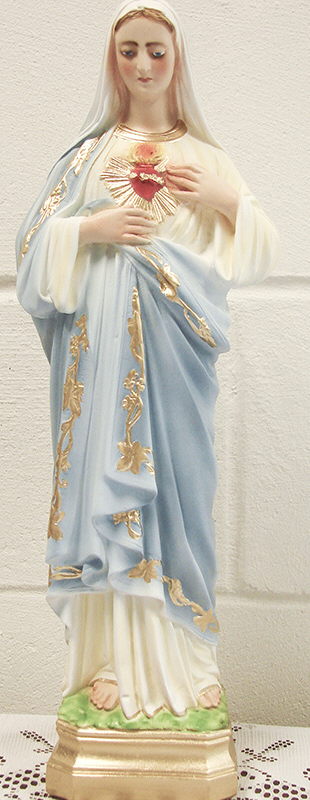 |
Immaculate Heart - Ivory - 18 |
Sacred Heart of
Jesus - 18 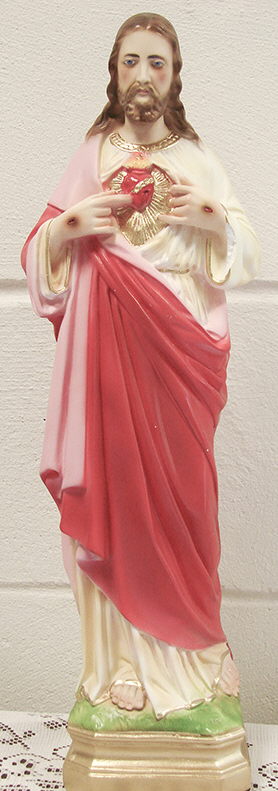 |
|
Our Lady of Lourdes - 18 |
Our Lady of Mt. Carmel - 18 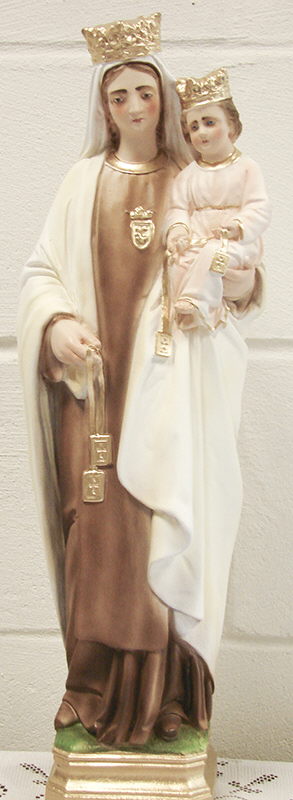 |
Our Lady of Grace - 18 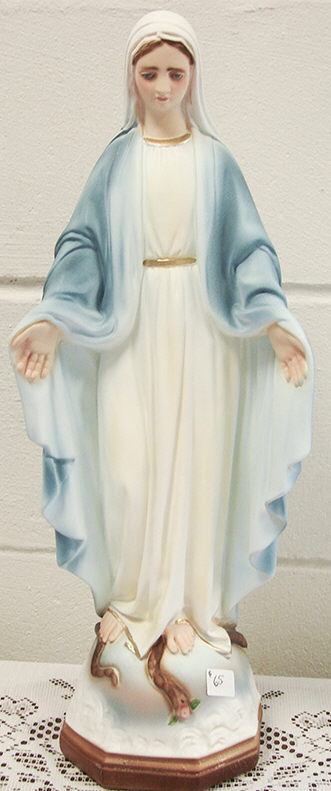 |
|
St. Francis - 18 |
St. Anthony - 18 |
St. Joseph - 18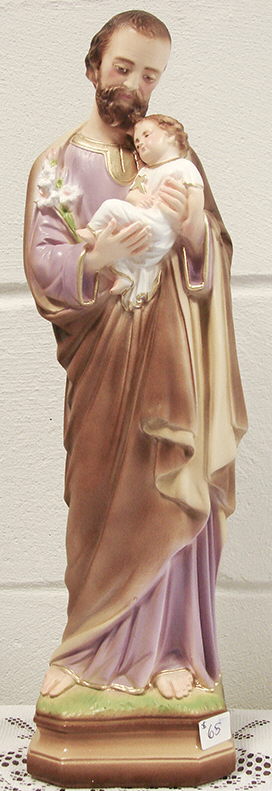 |
|
St. Therese - 18 |
Our Lady of Guadalupe - 12 |
St. Clare - 12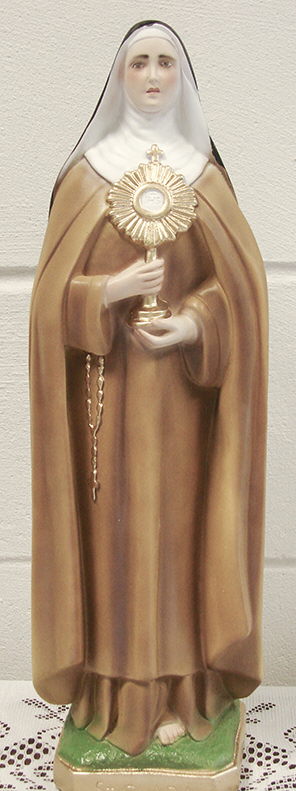 |
|
|
|
|
St. Padre Pio - 12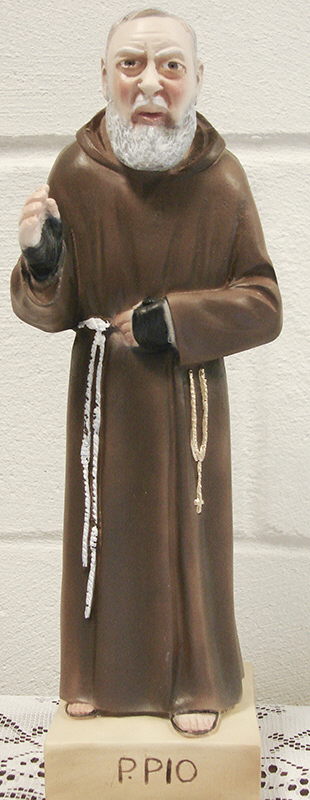
|
St. Rita - 12
|
Divine Mercy - 12
|
|
|
|
|
|
Pieta - Color |
Pieta - Marble 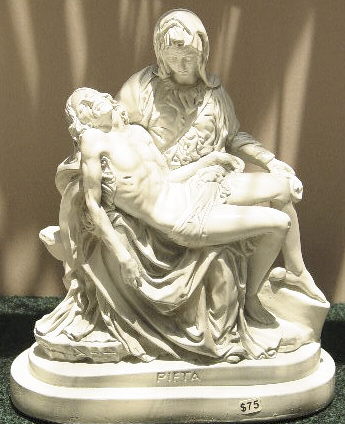 |
Limpias - 8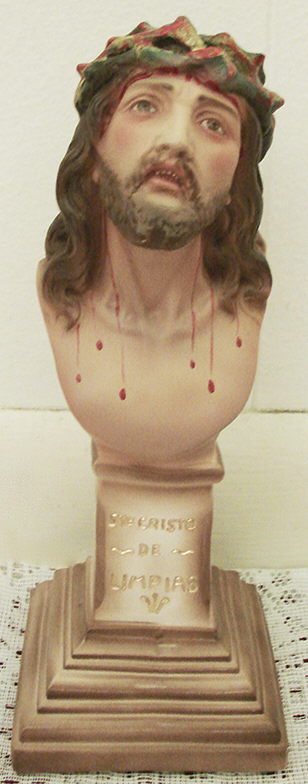 |
|
Fatima w/glass - 11 |
Pilgrim Virgin
w/glass - 12 |
Pilgrim Virgin
w/glass - 15 |
|
|
|
|
|
Fatima w/glass - 18 |
Pilgrim Virgin w/glass - 18 |
Pilgrim Virgin
w/glass - 27 |
|
|
Toll free - 1-888-211-3041 |
| Size | Price | Quantity | |
|
Holy Family |
24" |
$180 |
|
|
Immaculate Heart of Mary |
24" |
$125 |
|
|
Immaculate Heart - Ivory |
24" |
$125 |
|
|
Infant of Prague |
24" |
$125 |
|
|
Limpias |
24" |
$125 |
|
|
Our Lady of Grace |
24" |
$125 |
|
|
Our Lady of Guadalupe |
24" |
$125 |
|
|
Our Lady of Lourdes |
24" |
$125 |
|
|
Our Lady of Mt. Carmel |
24" |
$125 |
|
| Sacred Heart of Jesus |
24" |
$125 |
|
| Sacred Heart of Jesus -Blessing |
24" |
$125 |
|
|
Sorrowful Mother |
24" |
$125 |
|
|
St. Anthony |
24" |
$125 |
|
|
St. Claire |
24" |
$125 |
|
|
St. Francis |
24" |
$125 |
|
|
St. Joseph |
24" |
$125 |
|
|
St. Jude |
24" |
$125 |
|
|
St. Padre Pio |
24" |
$125 |
|
|
St. Therese |
24" |
$125 |
|
| Angel |
22" |
$100 | |
| Divine Mercy |
22" |
$100 | |
| St. Philomena |
20" |
$100 | |
| St. Philomena |
16" |
$65 | |
| Immaculate Heart of Mary |
18" |
$65 | |
| Immaculate Heart - Ivory |
18" |
$65 | |
| Sacred Heart of Jesus |
18" |
$65 | |
| Our Lady of Lourdes |
18" |
$65 | |
| Our Lady of Mt. Carmel |
18" |
$65 | |
| Our Lady of Grace |
18" |
$65 | |
| St. Joseph |
18" |
$65 | |
| St. Francis |
18" |
$65 | |
| St. Anthony |
18" |
$65 | |
| St. Rita |
18" |
$65 | |
| St. Therese |
18" |
$65 | |
| Pieta - Color | 15" | $75 | |
| Pieta - Marble | 15" | $75 | |
| Holy Family |
12" |
$60 | |
| Our Lady of Guadalupe |
12" |
$40 | |
| St. Padre Pio |
12" |
$40 | |
|
St. Rita |
12" |
$40 | |
| Divine Mercy |
12" |
$40 | |
| St. Claire |
12" |
$40 | |
| Limpias |
8" |
$25 | |
|
Fatima w/glass |
11" |
$150 | |
|
Fatima w/glass |
18" |
$250 | |
| Pilgrim Virgin w/glass |
12" |
$160 | |
| Pilgrim Virgin w/glass | 15" | $200.00 | |
| Pilgrim Virgin w/glass | 18" | $250.00 | |
| Pilgrim Virgin w/glass |
27" |
$450.00 |
|
|
|
|
Name |
Sub-Total |
|
Address |
IN Tax (7%) |
|
City |
Shipping |
|
State
Zip |
Donation |
|
Telephone |
Order Total |
Available for $750.00
Fatima/Clearwater Glass Statues available.Call or go to China
1-888-211-3041
6015 N. State Rd 62
China, IN 47250
or call Clearwater
21649 US 19 N
Clearwater, FL 337651-888-321-7671
1-727-725-9312
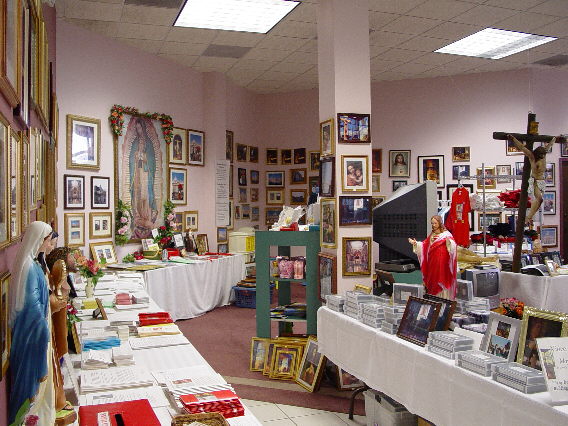
Brand New Internet Store